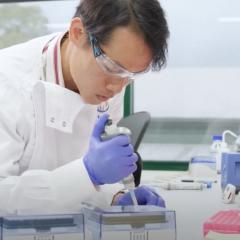University of Queensland Researchers and Pathology Queensland have found women under 50 with breast cancer are more likely to develop secondary cancer in the liver or gynaecological organs.
They also found patients with bone metastases, when the cancer spreads from one part of the body to another, had an increased chance of developing brain metastases.
Breast cancer is a leading cause of cancer related deaths worldwide, with about 90 per cent of these deaths due to secondary cancers (metastatic breast cancer).
UQ Centre for Clinical Research Lead Investigator Associate Professor Margaret Cummings said the results would improve breast cancer diagnosis and patient management.
“By better understanding how metastatic breast cancer evolves, clinicians can provide earlier intervention and more targeted treatment for those with or at risk of developing metastatic disease,” Associate Professor Cummings said.
“Secondary cancers in various organs show differences from the primary cancer which could be important in making treatment decisions.
“In the future, if possible, the metastases may have to be biopsied to get a more accurate profile for deciding therapy.”
Autopsy results of nearly 200 women who had fatal metastatic breast cancer were analysed at The Royal Brisbane and Women’s Hospital.
Metastases in a range of different organs were examined and compared to the primary breast cancer.
“Guidelines for the early diagnosis and treatment of breast cancer are well established but the management of patients with metastatic disease is much less clearly defined,” Associate Professor Cummings said.
Currently, treatment of metastatic disease is based on the phenotype of the primary cancer, and evidence is accumulating that this may not be appropriate.
“By carefully analysing the actual metastatic tumours from a large number of women with metastatic breast cancer, we wanted to understand how and why metastases spread to the different organs and how they behave in those different sites.”
Associate Professor Margaret Cummings works as part of Professor Lakhani’s breast cancer research group at UQ’s Centre for Clinical Research.
The group is collecting tissues samples of metastatic disease to improve the understanding of breast cancer progression.
To support the Brisbane Breast Tissue Bank and help continue the fight against breast cancer, donations can be made by calling 07 3346 6052 or visit www.uqccr.uq.edu.au/breastbank.
Media: Kate Sullivan, UQ Centre for Clinical Research 07 3346 6041 or k.sullivan4@uq.edu.au.



